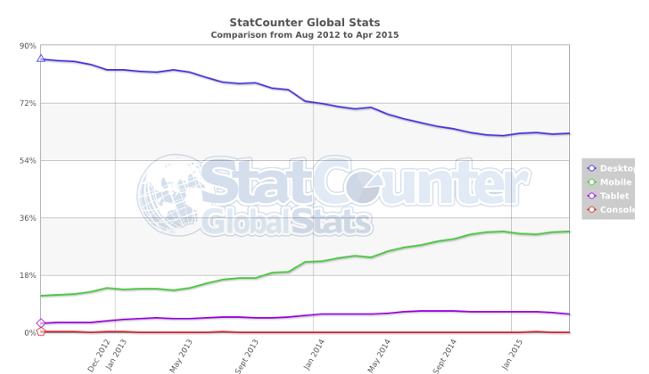Two days ago Google launched their new mobile friendly algorithm that has already become a byword among marketers. The algorithm, aka Mobilegeddon, will touch on the mobile search results only and will actually rank down websites with no or poor mobile optimization.
Google announced the algorithm back in February 2015 and let anybody test their website’s mobile friendliness upfront of its rollout. Those that failed the test had enough time to mobilize their web solutions. Bad news is that you should have a 100% mobile friendly page not to lose your current mobile search ranking. For Google, there’s no partially mobile friendly webpage! Good news is the devil is not so black as it is painted. First of all, if your website or its most important pages were not yet mobile friendly on April 21, you will not necessarily see any impact or drop in ranks right away. Google said it could take a few weeks for the algorithm to rollout, so you still have a good chance to react and make your website fully mobile responsive. Secondly, there’s no exact information on how Mobilegeddon will impact your non- mobile friendly website (and you don’t want to believe rumors, do you?). Yes, it is expected to be more significant than Google’s previous algorithms such as Panda and Penguin, and to change around 11% of all search results. But don’t cry out before you’re hurt!
Just for your information, Google ranked mobile friendly websites higher than non- mobile friendly ones long before April 21. According to Dr. Peter J. Meyers of Moz, 70% of Top Page results had been mobile friendly before the rollout of Mobilegeddon.
Read about software development company in Chicago.

- Global Search Data, Search Share by Devices
You should probably be freaked out if you have a DIY or MSP website, i.e. one created with automatic website builders and drag-and-drop tools. Stuart Crawford from Ulistic says that a staggering 84% of MSP websites have no mobile version. As such, they’re likely to fall prey to Mobeligeddon in the first place.
Having checked 25,000 top-ranked U.S. websites (according to Majestic Million and Alexa), online marketing agency Portent concluded that 10,000 websites (40%) failed the Google test. The Financial Times and Versace websites are among those losers, too. However, as Barry Schwartz wrote in Search Engine Land, large brands that haven’t yet gone mobile will not necessarily be affected much by this algorithm:
Google will still likely rank that brand in the first position even if the page is not mobile friendly. Ultimately, relevancy is more important and it outweighs this mobile algorithm. So if Home Depot was not mobile friendly and you searched for [home depot] on your iPhone tomorrow, it would still rank number one.
But if you’re a startup or SME, you should care more about optimizing your web properties for mobile.
In their Mobile SEO Guide for Developers Google mentions 7 key issues developers should fix to make sure their websites will rank high by Google after the launch of Mobilegeddon:
- Never block JavaScript, CSS and image files and always allow Googlebot access them to see your site as an average user.
- Avoid unplayable content and use HTML5 standard tags to include video or animation to your mobile webpage instead of using a proprietary video player.
- If you have separate mobile URLs, make sure your mobile users are redirected to the appropriate mobile URL on each desktop URL and not just to the homepage!
- If you see a user is visiting your desktop page from a mobile device and your equivalent mobile page has a different URL, always redirect them to that very URL instead of serving a 404 page.
- If you use your mobile page to promote your business native URL, use a simple banner (HTML or image) that is in line with your page content instead of using cumbersome interstitials.
- Make sure all of your links lead to the correct equivalent mobile page instead of having links pointing to irrelevant pages (e.g. when your mobile pages link to desktop’s homepage).
- Speed up your mobile webpage.
While you may spend weeks optimizing your website for mobile internally and lose ranks in mobile search as a result of this, Intersog can help you go mobile or improve your current mobile UX within just one week. Sounds interesting? Let’s talk!
Sources: Moz.com, mspmentor.net, portent.com, searchengineland.com, developers.google.com, StatCounter; featured image - searchengineland.com






